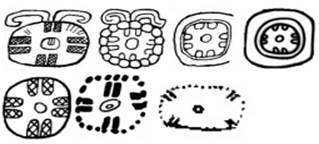 .
.
K&L.p21.#6 .
NIKTE’

![]()

![]()
TOK.p11.r5.c3 TOK.p32.r4.c4 BMM9.p12.r4.c3 JM.p184.#4 JM.p184.#3 = K&L.p21.#6.5
NIK NIK NIKTE’ NIKTE’ NIKTE’
· No glyphs given in K&H.
· Concerning the distinction between NIK and JANAAB, K&H.p36.fn44: The readings offered for both of these collocations are tentative as these include glyphic elements whose phonetic values are still debated. The first may be variously read as k’a[h]k’ tzih nik?, or k’a[h]k’nal nik?, where nik is a known term for “flower”, while in the other case the logogram may be read as janaahb, which based on other contexts also refers to a type of flower although a productive modern cognate is still wanting.
· BMM9, K&H, K&L state that NIK is an unspecified flower while NIKTE’ is a mayflower.
· Some uncertainty about whether it is read NIK or NIKTE’.
· Features:
o Boulder with two parallel non-touching bars at the North, South, East, West extremities.
o The bars are usually cross-hatched, pointing inwards but not reaching all the way to the centre.
o Central dot, not touching any of the bars.
o Optionally: “flames” element at the top [Sim: representing the fragrance of the flower].
· NIK is in some senses a “mirror image” of the stylized/boulder variant of JANAAB:
o In NIK, the four bars go from the outside not quite to the centre.
o In JANAAB, the four bars go from the centre not quite to the outside.
· Dorota Bojkowska: nik alone is flower, […?].